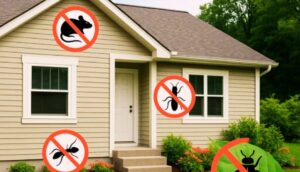DIY Pest Control [Infographic]
Pests around your home or yard can quickly become a real headache. Whether it’s bugs inside your kitchen or critters lurking outside, they not only cause discomfort but can also carry germs that might harm your family and pets. Acting fast is important to stop them from causing damage or spreading disease. The good news? You don’t always need a professional—there are plenty of easy and effective DIY pest control methods you can try yourself.
The first step is to identify the type of pest you’re dealing with because different pests require different treatments. Look for signs like droppings, nests, or damage to your belongings. Once you know what pest you have, you can pick the right products—like traps, sprays, or natural remedies—to tackle the problem. Remember, keeping your home clean, sealing cracks, and removing things like standing water or food scraps can also prevent pests from coming back.
Keeping pests away is a mix of treating the current problem and preventing future ones. Regularly checking your home and yard, reapplying treatments when needed, and maintaining good hygiene habits can make a big difference. If pests persist despite your efforts, calling a professional might be the best choice. But with some patience and the right tools, DIY pest control can help you keep your home comfortable and pest-free all year long.

10 Frequently Asked Questions (FAQs)
1. Can DIY pest control really work, or is it just a waste of time?
Absolutely, it can work! Many common household pests like ants, roaches, and spiders can be controlled using DIY methods—especially if you catch the problem early. The key is using the right products and staying consistent. Just remember: if things get out of hand, it’s okay to call in the pros.
2. What’s the safest DIY pest control method for homes with kids and pets?
Natural solutions like diatomaceous earth, essential oil sprays (like peppermint or tea tree), and baking soda traps are generally safe when used properly. Always keep any pest control product—natural or not—out of reach of children and pets, and read labels carefully.
3. How can I keep rodents out without using poison?
Try sealing up entry points with steel wool and caulk, setting humane traps, and placing peppermint oil-soaked cotton balls near suspected entryways. Rodents hate strong smells, so this can be surprisingly effective!
4. Is it possible to get rid of cockroaches with DIY methods?
Yes, but it takes persistence. Use gel bait, boric acid powder, and sticky traps to reduce their numbers. Keep your home clean and dry—especially the kitchen and bathroom. Roaches love crumbs and moisture!
5. What are the best natural repellents for ants?
Ants hate strong smells. You can use vinegar and water sprays, cinnamon powder, lemon juice, or peppermint oil around windows, doorways, and baseboards. Plus, they make your home smell great!
6. Do homemade mosquito repellents actually work?
Some do! Essential oils like citronella, eucalyptus, and lavender can help keep mosquitoes at bay when mixed with water or witch hazel and sprayed around. For serious infestations, though, consider combining DIY sprays with physical barriers like window screens or mosquito nets.
7. What’s an easy DIY trap for fruit flies?
A quick fix is a dish that is small, filled with apple cider vinegar and a drop of dish soap. The vinegar attracts fruit flies, and the soap breaks the surface tension so fruit flies can’t escape. Place a few around the kitchen and you’ll notice a difference fast.
8. How can I discourage spiders from entering my home?
Spiders hate citrus and strong scents like peppermint. Try spraying a peppermint oil and water mix around windows and door frames. Also, vacuum regularly and declutter—spiders love quiet, dusty corners.
9. Are there DIY solutions for termites, or should I always call a pro?
DIY termite treatments like boric acid dust, cardboard traps, or nematodes can slow down or reduce activity, but termites are tricky. If you suspect an infestation, it’s best to call in an expert before major damage occurs.
10. How do I make my own bug spray at home?
Mix about 10–20 drops of essential oils (like citronella, eucalyptus, or lavender) with 2 oz of witch hazel or rubbing alcohol, and a little water. Shake thoroughly and spray around windows, baseboards, and outdoor seating areas. It smells amazing and helps repel pests naturally!
Conclusion
DIY pest control doesn’t have to be overwhelming or expensive. With the right tools, a little consistency, and some natural know-how, you can tackle many common pests on your own—safely and effectively. Whether you’re using essential oils to repel ants or vinegar traps for fruit flies, these simple solutions can go a long way in protecting your home.
But remember, if a pest problem feels too big to handle, there’s no shame in calling in the pros. Until then, give these DIY tips a try and reclaim your space the natural way!










No one likes uninvited guests! Keep your home safe and pest-free with reliable pest control. Pests can be a big problem at home, but with the right pest control service, you can keep your family safe and your house clean. Don’t wait for pests to multiply — act now and enjoy a pest-free home! sorry man i can’t i am from philippines
Yes, once we do our part, our efforts will pay off in keeping pests at bay.